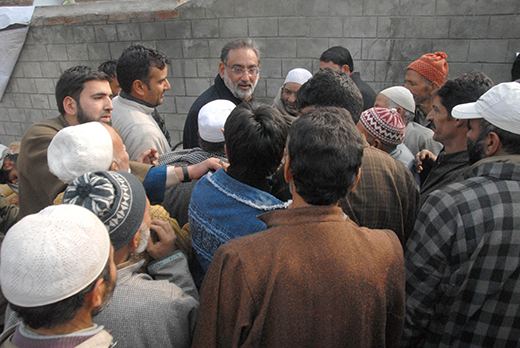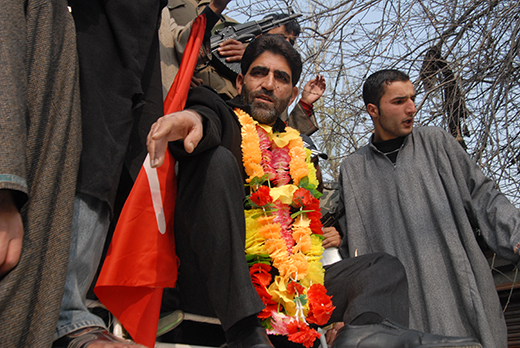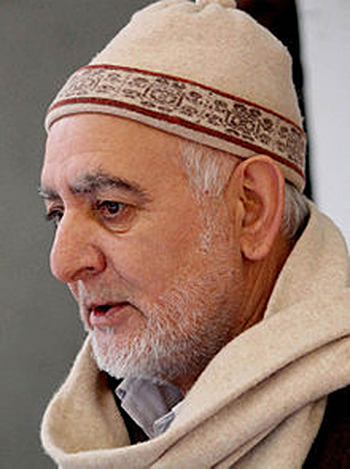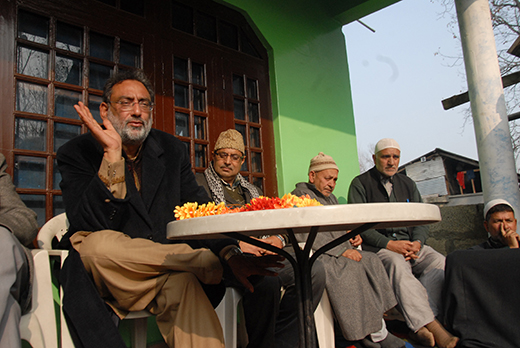In his professional career of 30 years, Haseeb Drabu wore many hats and made many rudimentary shifts in how J&K thinks, earns, saves and spends. After joining politics, he is pitted against south Kashmir’s traditional politicians in Rajpora which has emerged his new school and a new laboratory. Tasavur Mushtaq spends a day with the campaigning economist to understand how ground zero is not a miniature of the civil secretariat

In run-up to every election, some people change parties as the fresh flocks formally join. They get noticed. That is it. But when Dr Haseeb Drabu joined Peoples Democratic Party (PDP), it was fiercely reacted. His criticism of the statecraft and stand on critical issues concerning contemporary Kashmir had created an image of Drabu which was that of a ‘public intellectual’, who was just a whisker away from being dubbed a separatist.
With that image when he went to the office of the Returning Officer Rajpora for filling his nomination, reading out the oath and then signing the papers, Muzaffar Hussain Beig, PDPs MP and his one-time-boss congratulated and hugged him saying: “Dr Drabu, welcome to India.”
At 53, when this professional economist is trying to get into the state assembly, he is just formalizing his entry into the power-circuit because he was in ‘power’ for nearly two decades. Soon after getting his M&D Phil from JNU in economics, Dr Drabu entered the economic policy making circuit, initially in the Finance Commission. By the time, he was first time discovered by J&K government as a member of Godbole Committee in 1997, he had served Delhi’s various policy-making institutions and tackled crucial resource distribution within the states.
A prolific writer – (he wrote a series of pieces anonymously in a south Indian magazine that was a scathing criticism of counter-insurgency), he had later taken over the Business Standard as its national editor. After taking over as head of the PDP-Congress coalition, Mufti Muhammad Sayeed traced him, flew him to Srinagar, and appointed him as Economic Adviser (EA) to the state. Then, there was no looking back.
As EA to the state government, a position he retained (till Omar Abdullah took over as the Chief Minister in January 2009) besides being the Chairman and CEO of J&K Bank, state’s only listed company, Drabu has left indelible marks on policy-making, especially the public finance, energy front and investments in private sector. Barring a few initiatives that Omar government altered fundamentally, Drabu legacy is still visible.
Interesting part of his tenure as the chief policy maker of Mufti’s and later Ghulam Nabi Azad’s governments was that he was involved personally in most of the economic initiatives that Delhi launched.
In Vajpayee era, he played a key role for setting up Economic Reconstruction Agency (ERA) – J&K’s sole bucket to manage multi-lateral funding.
With Dr Manmohan Singh (with whom he had worked earlier in Planning Commission) Drabu almost authored Prime Minister’s Reconstruction Plan (PMRP), all the reports that C Rangarajan was entrusted including the one that was part of the Working Group initiative.
In J&K Bank, his tenure was dominated by the process of consolidation and giving it a futuristic direction. He rediscovered the home turf for managing bank’s surging exposure, exploded the myth that J&K being a petty economic space lacks credit absorption capacity. It clicked to the tune that bank’s exposure to the home state almost equaled its investment outside. It was logical: more investment outside was getting fewer yields and less investment within the state was offering better returns. Bank’s profits surged five times till Drabu was unceremoniously sacked in August 2010.

“The situation was scary,” a source closer to Drabu said. “The government had let a rumour in the market that he will be arrested.” As Drabu left Kashmir, almost in a huff, for Mumbai – his second home for years, the government did not let him stay in peace.
“Chief Minister Omar Abdullah and Dr Farooq Abdullah, then a minister in the cabinet, met Prime Minister requesting him not to give Drabu a role in the RBI, Planning Commission or in the Finance Commission,” a close friend of Drabu said. “The logic was that the decision might embarrass the Omar government.” But Drabu managed his decent survival while working for a few MNCs as he remained completely detached from Kashmir, almost in self-imposed exile.
“I had worked with three Chief Ministers and I had good relations with all but I was punished for being a professional,” Drabu tells a modest gathering in Tahab, while campaigning. “As the state was under curfew, people were getting injured and we had the reports that people lack access to the money they had deposited with the banks, I thought it is criminal if people will live in penury when they need it most: to treat the injured and manage their food, so I stuffed the ATMs with cash and that was what was played against me.”
Drabu had won the first battle when he shot a scathing response to the Home Ministry that had questioned his wisdom of reversing bank’s credit structure: investing more in J&K and less outside the state. The next time, they caught him, he was literally exiled. He also faced severe reaction when he identified the private financers for investing in the tunnel that would connect Kashmir with Kishtwar through Vailoo. The project, though abandoned by Omar, is possibly being revived as this is the major demand of the Chenab region.
That a strong government is required, to defend the people it trusts with its institutions. That was the instance where Drabu’s urge to help create a strong governance system took roots. And that is precisely what he is preaching about. “We just do not want to change the government, we want to change the politics of the place so that we are able to master our requirements,” Drabu tells people in Arihal. “We must have the right to our resources and right to use it with dignity. We need to ensure a change that lacks disrespect to the genius of Kashmir.”
The top notch economist that Kashmir ever produced, however, is least known as a political scientist. Even before Omar sent him packing to Mumbai, Drabu had given PDP, the Self Rule idea. The document eventually became the political bible of a party that Mufti had founded to fill a political vacuum and gave it a direction. Self rule was an instant comparison to NCs autonomy with only major difference that autonomy stopped at LoC and Self rule tried to cross-over. It was as fresh as PDPs recent manifesto that weaves economics with politics to convey that J&K can still protect the fig-leaf of exclusivity in Indian federation by using the same abused and misused Article 370.

After resuming his K-connection, which started with his widely read weekly column in Kashmir’s premier newspaper, Drabu started dabbling on certain key social issues as well. At a seminar, he in fact triggered a debate over the management of the mosques – the key scared space in the Muslim societies. “If we take utmost care in making selections of the timber or cement that goes into making of our homes, what about the mosques,” Drabu told a select gathering. “Anybody who approaches you claiming he knows reciting the Koran, you appoint him as your Imam, even without knowing if at all he is a Muslim.”
Regardless of societal response to his writing, Drabu took the idea home. While campaigning, he tells every village to create a committee that has mosque as its epicenter. “If all the facilities and the services are created around the mosque, it improves monitoring and makes the praying space as epicentre of societal interactions,” Drabu said. “I am seriously working to create basic relief structure that people will contribute to and manage at their levels to address destitution and calamities.” The process, he says, has begun.
Drabu denies his dive to politics was in reaction to his dismissal as chief executive of the J&K Bank or Omar government’s failure to retain the growth trajectory he identified for J&K. He says his idea of contribution to the well being of the society is more in doing rather than preaching. That was perhaps why he went to contest rather than waiting for a berth in state legislative council. “That compromises one’s legitimacy,” Drabu says. “It is better to contest and then have a right to preach and implement.”
Now campaigning literally for four months now, Drabu says it is new world that could barely be imagined from the warm environs of the civil secretariat. “I am impressed by the talent pool we have on ground, the little big aspirations that the new generation has,” Drabu said while shuttling from one village to another. “I am amazed by the potential yield that even small investments can trigger in the human and the natural resources that we have.”
For managing the basic facilities of the society, Drabu says small funds are required. “I have the capacity to mobilize lot of funds,” Drabu tells a village gathering. “But the larger issue is where are the hands that will help spending properly.” His focus on ground zero is to help people understand the basic thing that having resource is easier than utilizing it – something that happened to the water resource, the tourism, and more importantly to agriculture.
In Tahab, Drabu in a public meeting reveals he was hesitant to join politics given the type of people in this field and the way it is done in Kashmir. “My joining politics is an experiment that Mufti Sahab is conducting,” he tells a receptive crowd. Pleading voters that if he gets a chance to get into the assembly, “more people like him will follow that eventually will help changing the politics of this place.”
Unlike his opponents, Drabu make a different point to his voters: “your representatives should have thumping majority backing him which makes him put the point across with an authority”. This, he says, is because once a Congress leader from Jammu questioned his Kashmir counterpart saying – with how many votes, you won?
But his plunge to politics has remained bumpy. His party denied mandate to Mufti’s old follower Syed Bashir, who represented this constituency twice. It created a sort of crisis as Syed issue statements and even get sizable groups to protest. Finally Bashir was expelled from basic membership of PDP.
Drabu is fighting from Rajpora that has eight other contestants. But the interesting story is that it has two major contesting parties literally bifurcated on ground, at least for the symbolic reasons. Take NC: it fielded Mohiuddin Mir ignoring Ghulam Nabi Wani Niloora. Mir had representing this seat in 1996 and lost it to Syed Bashir in 2002. In last assembly polls in 2008, when Mir was denied a mandate, he contested independently and lost it by a small margin. NCs official candidate Ghulam Nabi finished third. That wisdom helped Omar to field Mir as official candidate but it forced Ghulam Nabi to contest independently. Now the NC vote will get divided between the two and Mir will still get more votes because he is firmly rooted in Murran-Bellow belt where most of the clan lives.

Though PDP insiders say the party vote bank is intact as Syed Bashir, contesting independently, will end up taking not more than the margins with which he won in 2008, still he has the capacity to reduce margins. The contest in this segment is getting intensely interesting as Kashmir’s only known economist of consequences is fighting his maiden election.
For National Conference’s Mir, Drabu’s loss is inevitable because he is an outsider. “People don’t know him. He is not among us. He has been brought from somewhere and placed here, so his loss is certain,” Mir said. The last 12 years of PDP representation, Mir said there was no development. “There is no drinking water available. To have electricity is big thing, various villages even don’t have requisite infrastructure.” Mir is confident that he will make Drabu lose. “In 2008 I lost by 242 votes as an independent candidate and this time I have backing of a very strong old and strong party, so I am placed comfortably.”
This is a fact that the politicians contesting Drabu lack anything sensational against him. Their campaign against him has only two ingredients: he belongs to a feudal Zaildar family, a tradition that Sheikh Abdullah ended and should not be revived; and that he is a high end elite who drinks imported water, speaks English and cannot shake hands with commoners!
While emphasis of his campaign has remained on the ‘change’, Drabu says one point has actually helped him. “The consistent insistence on me being an offspring of a Zaildar family has helped people relive the days of Aziz Mir, my great-grand father who has been extremely helpful to families and communities,” Drabu said. “Every village I go, elders talk of those days and give me instance of his functioning and working which I would have never got. Now I can write in detail and with firsthand accounts how that system worked differently from place to place.”
But to ensure that he is not an elite and racist as his opponents say, Drabu never says ‘no’ to anything at any time. “I end up having two or sometimes three lunches,” Drabu says showing his pot-belly. “I though, I will reduce weight by moving a lot during campaigning but I ended up amassing fat and lot of it.” It remains to be seen how Drabu will melt his weight once the elections are over!
















A self proclaimed intellectual like Drabu who switches sides quite conveniently to remain relevant in both separatism and mainstream can never be a well wisher of Kashmiris. He is with people till he gets a better opportunity. A simple careerist and nothing more. I can understand why your esteemed newspaper chose to put him on cover at such a crucial time. After all everything is reciprocal.
Beautiful article Tasavur…well written…really creative and hardwork in the background…but eulogistically coloured for a turncoat of a man not deserving this…you might be his fan but i grade him as a self revolving egoistic chameleon..
i know Drabu as a person from distance…i know how he interacts with people to get his illogical things done…he treats his men good for his interests and behave nicely…talk to those he bargains with…he was with separatists then with NC and now with PDP…a real turncoat…there are hundreds in politics like him…but was an intellectual…the ray of hope for the people of Kashmir…alas!i found him a hollow cocoon…i was his fan but he disappointed me…
He talks about Aziz Mir responsible for martyrs day ! He loves his feudal nature which itself is criminal in nature .Such a crony capitalist , wonder how can he be a socialist . Mufti chose him may be because they have some common to share ,the imported water.
He is proud to be a feudal which itself is a crime to modern day of equality .Aziz Mir and is Son Gul Mir accused in martyrs days killings . His neighbour the chief justice too campaigns but against him . A crony capitalist and a political renegade or a turncoat , brought back by Mufti because they have something common to share , the imported Only a fool argues with a fool. ! And No wonders that he has narrated the story of his invisible achievements very well ! Will he really work for the welfare i mean Capitalists and socialists are not same coins !